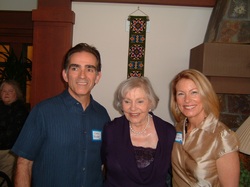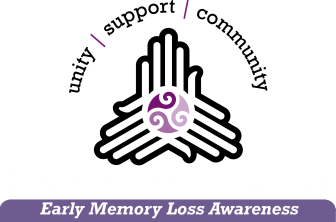 My mom's 90th birthday party in November 2009
My mom's 90th birthday party in November 2009 The journey of living with someone with Memory Loss is a random and challenging trail to traverse. Our daily lives become unpredictable and it can uproot the delicate balance of our lives. Everyone’s experience and family histories are different. The dynamics of each relationship are different, but the one common denominator that we all have in providing for our loved one is that we need to take care of our own well being first. The metaphor of being on an airplane in an emergency with a child is so true: “If we don’t place the oxygen mask on ourselves first, we won’t be able to help anyone else.” It’s also easier said than done. Taking care of ourselves is a common topic in our support group and there is never an easy answer and many times, we say “yeah, right”. However, it is still our responsibility to care for ourselves and those around us. After all, the best medicine is to stay healthy. I have been the daughter of a father with a terminal illness, I have been the daughter of a mother with vascular dementia (small strokes in the brain) and I AM now the wife of someone who has been diagnosed with Alzheimer’s. As a daughter of someone who had dementia, the role was vastly different than having a life partner with dementia. My role in caring for my mom was much clearer. I remember saying to myself, “Okay, I need to be the parent now and you are now like my child”. It was also a role that I was able to share with my sister Vicki.
When your life partner has Memory Loss, the changing roles can be very confusing. The person who has been your friend, partner, lover and confidante is no longer available the same way they used to be. There are times that feel like they always did and you naturally lean in and enjoy that relationship that is so wonderfully familiar. Then, there are the times when it is clear that it's not the same and the cloud of sad reality is once again overhead with the reminder of how the cruelty of this disease affects all who are involved. A strange feeling of loneliness and isolation can come into play because you just can’t have the depth of the conversations that you used to enjoy together. Those with Early Memory loss begin to lose their critical thinking skills and their executive functions (such as the ability to plan ahead or make decisions). Many of the conversations we have need to be repeated over and over again. I call it the new version of 20 questions; the same two questions 10 times. It can be just as frustrating for Gary as it can be for me. I have learned to just let it roll, but we all have our moments! It certainly helps to be patient, loving and kind. It also helps to keep your sense of humor!
I’m going to introduce the term Care Partner to see if it is a role that may fit for you. Please feel free to engage in the following exercise so you can “try on” both roles: Take two blank sheets of 8 ½ x 11 paper. On the first sheet write in large letters “Caregiver” and on the other write “Care Partner”. Place both sheets of paper on the floor about 18 -24 inches apart. Stand and look down at the first sheet of paper and notice how that feels, take it in. What do you notice? Take your time. Now move over to the second sheet with the words “Care Partner”. Notice if there is a difference in how you perceive the two terms.
The Alzheimer’s Association uses the term “Care Partner” and I have absolutely loved the term since the moment I first heard it. It’s a word thing for me and it literally feels different if I refer to myself as Gary’s Care Partner. I see it as an empowering metaphor and I use it to self manage my perspective to see both of us as “whole and complete”. It is a very subtle distinction in how I view my role in our ever shifting relationship. Try it on and see what you think. For me, the word caregiver isn’t right for me in this role with my husband; my partner. The word caregiver itself makes me feel more depleted; as if I could give and give without being able to care for myself. As his partner, I feel that I can keep both of our interests in better perspective and I am compelled to meet other care partners that share this journey. I am Gary’s Care Partner and I have chosen this role with love, dignity and honor. We may not have chosen these circumstances, but we can make choices that will help us to remain as healthy and whole as possible throughout this journey. Caring for a loved one can be a tricky role. How do you see your role? What choices are you making for yourself? How can we help each other?
LB


 RSS Feed
RSS Feed
